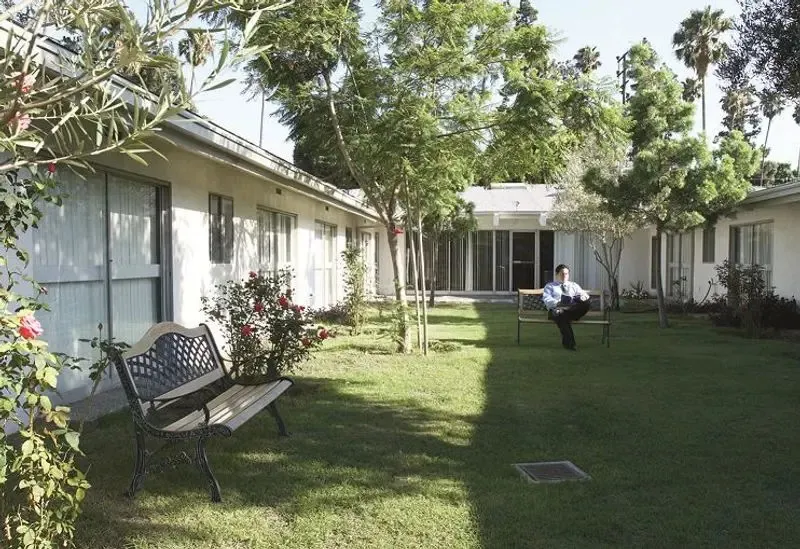Explore leading trauma treatment centers and facilities in Los Angeles and nearby areas. Trauma treatment centers provide vital support for individuals recovering from emotional wounds caused by events such as abuse, violence, accidents, or loss. These programs use evidence-based therapies—including EMDR, CBT, and trauma-informed counseling—to help individuals process trauma responses, reduce anxiety, and rebuild a sense of safety. Compassionate care environments, mindfulness practices, and peer support groups empower individuals to find healing, regain control, and rediscover their inner strength. Find the best trauma treatment centers in Los Angeles dedicated to helping people achieve lasting recovery and emotional resilience.
Ads
More Info
Advertisement Disclosure
Our website is funded by advertisers who pay for prominently labeled placements.
Read More180 Rehab Centers were found
Filters
Locations
- Los Angeles(+98)
- Culver City(+14)
- Westlake Village(+13)
- Woodland Hills(+11)
- Beverly Hills(+10)
- Santa Monica(+9)
- Sherman Oaks(+7)
- West Hollywood(+6)
- Malibu(+5)
- Chatsworth(+5)
- Pasadena(+5)
- Encino(+5)
- Redondo Beach(+4)
- Lancaster(+4)
- Reseda(+4)
- Studio City(+4)
- Northridge(+3)
- San Mateo(+3)
- Lynwood(+3)
- Vernon(+3)
- Van Nuys(+3)
- Tarzana(+3)
- North Hollywood(+3)
- Glendale(+3)
- Gardena(+3)
- Riverside(+3)
- Granada Hills(+2)
- Shadow Hills(+2)
- Venice(+2)
- Orange County(+2)
- Pomona(+2)
- West Hills(+2)
- Valley Village(+2)
- Burbank(+2)
- Brentwood(+2)
- Long Beach(+2)
- Sun Valley(+1)
- Torrance(+1)
- San Jacinto(+1)
- San Pedro(+1)
- Upland(+1)
- Whittier(+1)
- Toluca Lake(+1)
- Thousand Oaks(+1)
- Simi Valley(+1)
- Mission Viejo(+1)
- Acton(+1)
- Beaumont(+1)
- Wilmington(+1)
- Panorama City(+1)
- Anaheim(+1)
- Laguna Hills(+1)
- Inglewood(+1)
- Alhambra(+1)
- Rosemead(+1)
- Maywood(+1)
- Manhattan Beach(+1)
- Monterey Park(+1)
- Claremont(+1)
- Covina(+1)
- La Puente(+1)
- Pico Rivera(+1)
- San Fernando(+1)
- Azusa(+1)
- Santa Fe Springs(+1)
- Glendora(+1)
- Agoura Hills(+1)
- El Segundo(+1)
- Duarte(+0)
- Sunland(+0)
- Downey(+0)
- Cudahy(+0)
- El Monte(+0)
- Compton(+0)
- Hermosa Beach(+0)
- Cerritos(+0)
- Calabasas(+0)
- Bellflower(+0)
- Bell Gardens(+0)
- Avalon(+0)
- Arcadia(+0)
- Altadena(+0)
- Paramount(+0)
- South El Monte(+0)
- Walnut(+0)
- West Covina(+0)
- Santa Clarita(+0)
- San Gabriel(+0)
- San Dimas(+0)
- Rolling Hills(+0)
- Orange(+0)
- Hawaiian Gardens(+0)
- Palmdale(+0)
- Norwalk(+0)
- Montebello(+0)
- Lakewood(+0)
- South Pasadena(+0)
- Carson(+0)
- Hawthorne(+0)
Conditions
- Drug(+278)
- Alcohol(+219)
- Mental Health(+195)
- Opioid(+193)
- Cocaine(+184)
- Trauma(+180)
- Methamphetamine(+177)
- Benzodiazepines(+174)
- Heroin(+173)
- Prescription Drugs(+159)
- Depression(+152)
- Anxiety(+149)
- Xanax(+145)
- Synthetic Drugs(+138)
- PTSD(+133)
- Adderall(+131)
- Marijuana(+112)
- Bipolar(+109)
- Ecstasy(+104)
- MDMA(+99)
- Behavioral Health(+93)
- LSD(+93)
- Psychedelics(+91)
- Fentanyl(+71)
- Stress(+71)
- OCD(+69)
- Personality Disorders(+63)
- ADHD(+61)
- Gambling(+38)
- Eating Disorders(+35)
- Anorexia(+34)
- Binge Eating Disorder(+34)
- Bulimia(+33)
- Schizophrenia(+32)
- Gaming(+28)
- Internet Addiction(+27)
- Sex Addiction(+25)
- Burnout(+23)
- Pornography(+22)
- Shopping(+10)
- Narcissism(+8)
Insurances
- BlueCross BlueShield(+129)
- Aetna(+126)
- Anthem(+105)
- Cigna(+105)
- United Healthcare(+66)
- Humana(+63)
- Optum(+53)
- Medicaid(+53)
- MHN(+51)
- Magellan Health(+47)
- Kaiser Permanente(+39)
- Medicare(+31)
- GEHA(+31)
- ComPsych(+29)
- Highmark(+25)
- AmeriHealth(+13)
- Tufts Health(+11)
- Oscar(+9)
- CareFirst(+9)
- Molina Healthcare(+8)
- Intermountain Healthcare(+6)
- Beacon Health Options(+2)
- UMR(+2)
- NYSHIP(+2)
- ILWU(+2)
- Geisinger(+2)
- Empire Life(+2)
- Empire BCBS(+2)
- Bright Health(+2)
- GuideWell(+1)
Therapies

$30,000-$50,000

N/A

N/A

Call for Rates - 30+ days

Call for rates - 7-30 days

$1,000/day - 30+ days
Comprehensive Trauma Treatment Programs and Recovery Resources in Los Angeles
Trauma is a deeply distressing emotional and psychological response to events that threaten a person’s sense of safety, stability, or well-being. While some people recover naturally from traumatic experiences, others struggle with lasting effects such as anxiety, flashbacks, emotional numbness, and difficulty trusting others.
Unresolved trauma can impact daily life, relationships, and mental health, often leading to conditions such as post-traumatic stress disorder (PTSD), depression, or substance use. Many individuals attempt to suppress or ignore their trauma, but without proper treatment, symptoms can worsen over time. To better understand the different conditions related to trauma, visit our conditions directory for more information.
In Los Angeles, a wide range of trauma-focused treatment programs help individuals process painful experiences, regain control over their emotions, and rebuild a sense of stability and resilience. These programs are often integrated with evidence-based therapies and holistic care approaches.
Understanding Trauma and Its Effects
Trauma can result from a single distressing event, such as an accident, assault, or natural disaster, or from prolonged exposure to harmful situations, such as childhood neglect, domestic violence, or combat experiences.
Some of the most common sources of trauma include:
- Physical, emotional, or sexual abuse
- Car accidents or other life-threatening events
- Military combat or witnessing violence
- Loss of a loved one or sudden grief
- Medical trauma or prolonged illness
- Childhood neglect or abandonment
Not everyone who experiences trauma develops long-term psychological effects. However, those who do may struggle with intrusive memories, emotional dysregulation, and an inability to feel safe even in secure environments. For individuals with more complex presentations, such as personality disorders or anxiety disorders, integrated treatment may be necessary.
Signs That Trauma Treatment May Be Necessary
Many individuals minimize their trauma, believing they should “move on” or that their experiences were not severe enough to warrant treatment. However, untreated trauma can manifest in various ways, including:
- Frequent nightmares or flashbacks of the traumatic event
- Emotional numbness or difficulty experiencing joy
- Avoidance of people, places, or situations that trigger memories of the trauma
- Anxiety, panic attacks, or a constant sense of being on edge
- Difficulty forming or maintaining close relationships
- Unexplained physical symptoms, such as headaches, fatigue, or chronic pain
- Substance use or self-destructive behaviors as a way to cope (see more about substance use disorder treatment)
If trauma is interfering with daily life, relationships, or emotional well-being, seeking professional help can provide tools for healing and recovery.
Trauma Treatment Approaches
Trauma treatment is not about erasing painful memories but rather helping individuals process and integrate them in a way that reduces emotional distress.
Eye movement desensitization and reprocessing (EMDR) is a leading trauma therapy that helps individuals process distressing memories in a structured way, reducing their emotional intensity. EMDR is particularly effective for PTSD and complex trauma.
Trauma-focused cognitive behavioral therapy (TF-CBT) helps individuals reframe negative thought patterns and develop coping strategies for managing emotional triggers. Some people benefit from programs tailored to specific concerns, such as schizophrenia or ADHD, if trauma co-occurs with these diagnoses.
Somatic experiencing focuses on how trauma is stored in the body. Many people with unresolved trauma experience physical symptoms or feel disconnected from their bodies. This therapy helps release stored tension and reestablish a sense of physical safety.
Group therapy provides a space for individuals to connect with others who have experienced similar traumas. Many people feel isolated in their struggles, but hearing others’ experiences can foster healing and validation.
Medication may be recommended for individuals struggling with trauma-related anxiety, depression, or sleep disturbances. While medication does not erase trauma, it can help stabilize emotions and make therapy more effective. Holistic therapies—such as mindfulness, yoga, or art therapy—are also widely available at many treatment centers throughout Los Angeles.
Healing and Moving Forward
Recovering from trauma is a process that takes time and patience. Healing does not mean forgetting what happened but learning how to live without being controlled by past experiences.
Building a support system is essential. Trusted friends, family members, or trauma-informed therapists can provide encouragement and understanding throughout the healing journey. For many, peer support can be found through specialized trauma or burnout recovery groups.
Self-care plays a critical role in trauma recovery. Activities such as exercise, journaling, meditation, and spending time in nature can help regulate emotions and provide moments of peace.
For many individuals, trauma therapy leads to a greater sense of self-awareness, resilience, and emotional strength. Over time, painful memories lose their grip, and individuals can move forward with confidence and a renewed sense of well-being.
Finding Trauma Treatment in Los Angeles
Los Angeles offers a variety of trauma treatment options, including specialized therapy centers, inpatient recovery programs, and outpatient counseling services. Finding the right treatment depends on the severity of symptoms, personal preferences, and whether additional mental health conditions are present. For additional mental health support, explore mental health treatment centers across the region.
Speaking with a trauma specialist can help determine the best approach for healing and recovery. Many clinics offer free consultations to guide individuals toward the support they need.
Frequently Asked Questions
Can trauma go away on its own?
What is the most effective therapy for trauma?
How long does trauma treatment take?
Is trauma treatment covered by insurance?
Ads
More Info
Advertisement Disclosure
Our website is funded by advertisers who pay for prominently labeled placements.
Read More






































